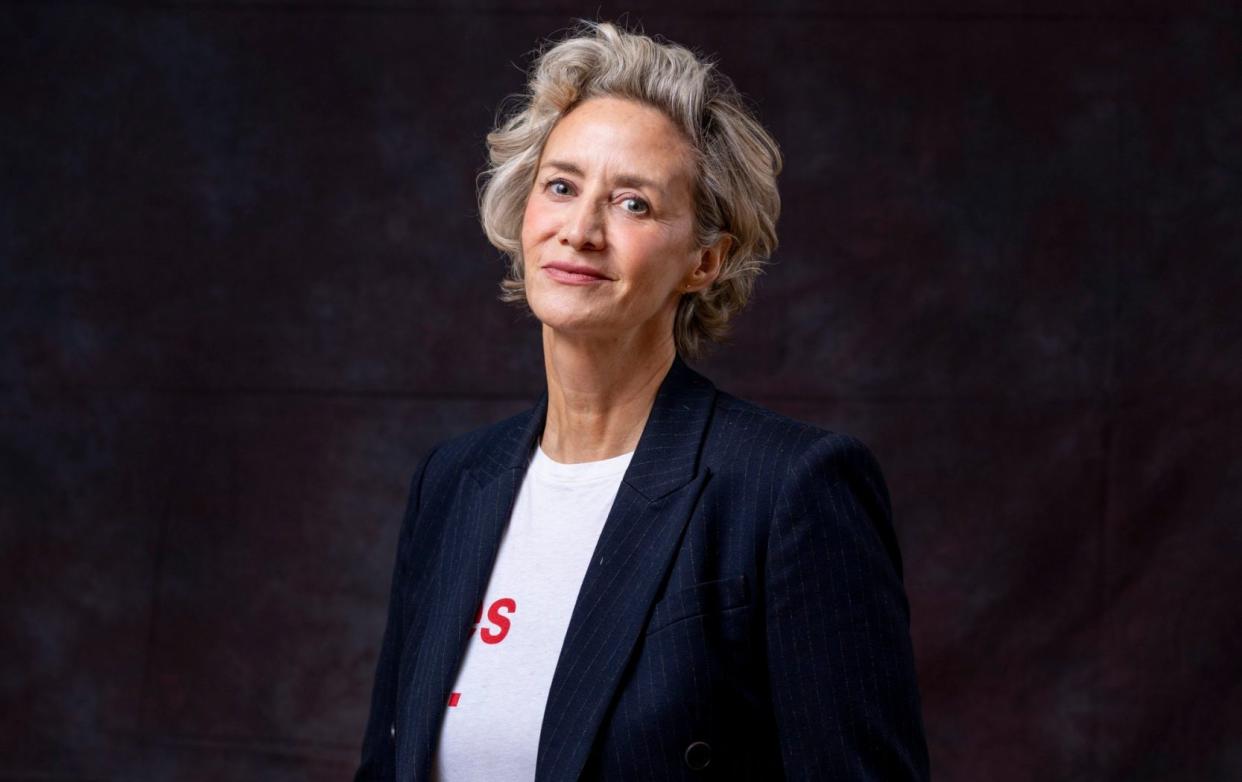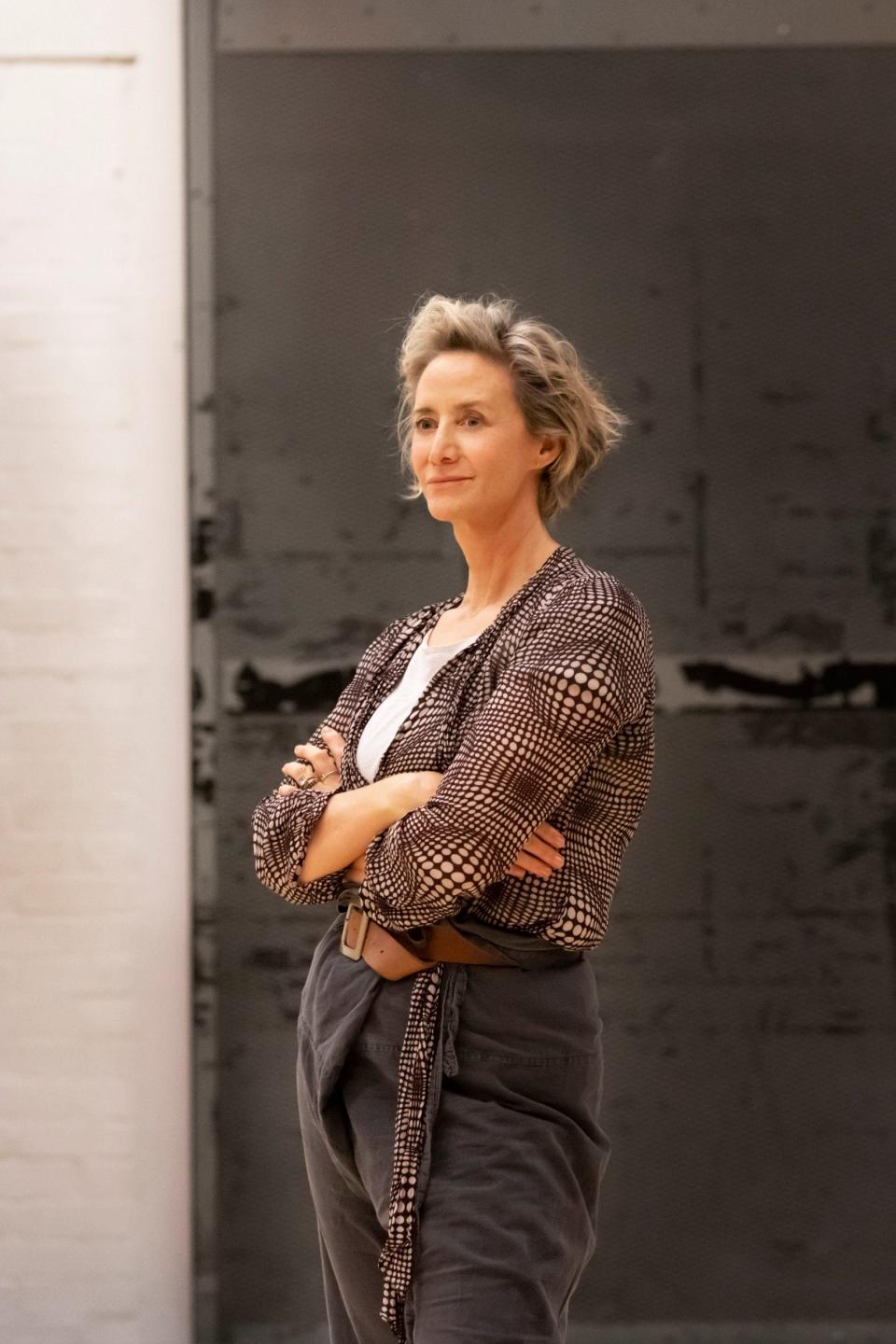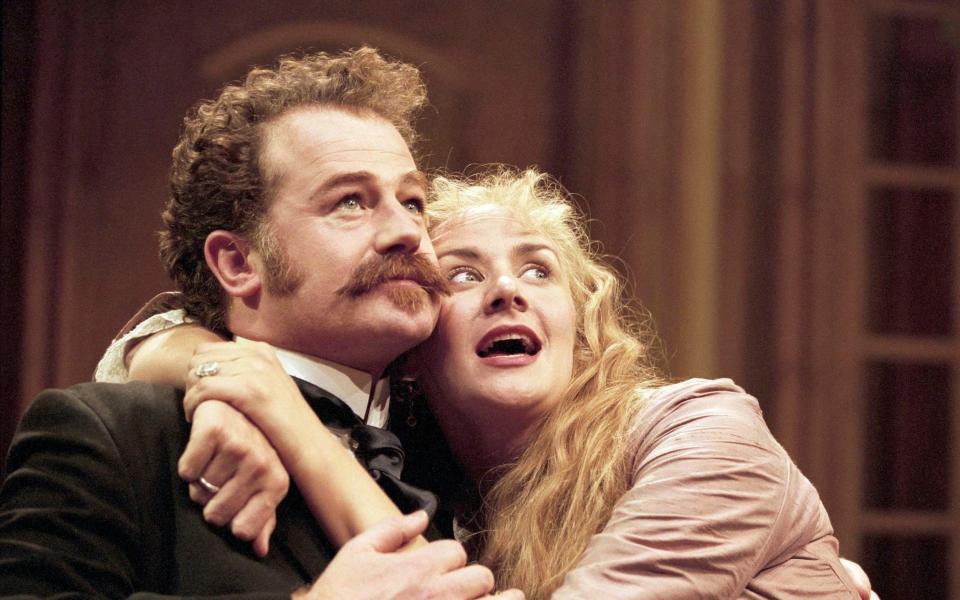Janet McTeer: ‘I realised very quickly that I was never going to be the pretty one’

Poor Phaedra. Only Medea has been more condemned by history as a female figure in ancient Greek myth. First, she scandalously falls in love with a younger man – her stepson Hippolytus, no less – and secondly, when knowledge of her obsession threatens her position and her family, she falsely accuses him of rape, resulting in his appalling death by horses at the hands of Poseidon. As a result, she’s often been viewed as a shameless lying hussy, despite no one batting an eyelid at her husband Theseus, who actually did rape and pillage with inconsequential abandon.
At least, says the actress Janet McTeer, Phaedra has the “redeeming” grace to kill herself. “It’s not like she goes on to rule the world,” McTeer points out, her 6ft 1in frame languidly stretched out on a chair in the National Theatre’s small interview room. “Anyway, in our version, we’ve opted not to go down the rape route. It felt a bit unfair to use that against her again.”
One of our finest actors, McTeer, 61, is back on the London stage after an absence of several years to play the tragic anti-heroine of various plays by Euripides, Seneca and Racine: she’s spent the last decade almost exclusively in America, where she met her now husband, the poet Joseph Coleman, after starring in the West End transfer of Schiller’s Mary Stuart in New York in 2009.
Moreover, Phaedra has been adapted and directed by Simon Stone, the Australian wunderkind whose radical reimagining of Lorca’s Yerma at the Young Vic, starring Billie Piper, was one of the must-see shows of 2016.
His modern take on Phaedra takes a similarly revisionist approach: for one thing, Phaedra is now a woman of immense power in her own right. Exact details of the script are under wraps; all the same, if Phaedra no longer accuses Hippolytus of sexual assault, can McTeer say what happens instead? “Phaedra originally cried rape because it was the only power available to her,” McTeer says. “Our version is not about rape, it’s about someone using their power to get revenge. Will she still be seen as the villain of the piece? Probably. But for me, the epic nature of the Phaedra story was always about someone whose feelings are totally out of her control at a time in her life when she might have assumed she’d have got it together.”

McTeer has a no-nonsense elegance about her that feels very English, despite her years in America. (She dismisses, for instance, the whiff of transgression that persists to this day around older women like Phaedra who fall for younger men as tiresome. “I really don’t care who people love,” she says. “Do you?”) The York-raised actress remained in America for so long because of her American family, living in what sounds like glorious pioneer-style isolation in Maine, in a house she and her husband built themselves in the woods. But this year her step-son left for university, leaving her an empty-nester and fancy-free, able to take jobs wherever she wishes. Not that America hasn’t been excellent for her career – partly, she says, because her time there has coincided with the rise of streaming. Recent small-screen hits have included Sorry for Your Loss and Netflix’s Emmy-nominated crime thriller Ozark, in which she co-starred as an uncompromising barrister opposite Jason Bateman and her good friend Laura Linney.
Yet it is on the stage that she has notched up some of her finest work, perhaps because she has always opted where possible for the “most interesting” female roles. The rebels, the disrupters, the women who’ve bucked against convention. She’s played the avowed anti-romantic Beatrice opposite Mark Rylance in Much Ado About Nothing and the game-changing Nora in A Doll’s House – the only time, she says, she’s deliberately made herself “appear shorter” than she is.
“I love Death of a Salesman, for instance, and Linda [Willy Loman’s long-suffering wife] is an amazing character, but the idea of playing a woman who puts up with everything and makes it all work – that’s not been me in life and it’s not something I relate to that well,” she says. “The world has changed for the better, thank God, but all those things that have annoyed women forever are still there. And there is something very exhilarating to me about playing the sorts of roles that make you go: women too can be this strong, and this messed up, and this extraordinary.”

Ironically, McTeer’s height and looks may well have helped propel her towards such roles. As a student at Rada in the early 1980s, where her contemporaries included Ralph Fiennes, she decided she wasn’t cut out for ingenue parts. “I realised pretty quickly I was never going to be the pretty one,” she says.
She achieved early success, notably as the lead in a BBC adaptation of Mary Webb’s Precious Bane (1989), but when she first tried her luck with Hollywood in 1997, she says: “I realised I didn’t fit the Hollywood ideal either, so I came home again. And it was ugly and painful for a bit, but I have since realised I have a certain strength of passion and being that fits the way I look and I’m not going to apologise for that. I’m happy being slightly different. And I’m sure there have been many jobs I’ve lost because I was taller than my cohort but I’ve never heard about them, so that’s fine.”
The subject is slightly absurd – McTeer combines a bone structure to die for with an effortlessly commanding natural grace. All the same, few actresses manage to create a CV that defies gender stereotypes with such consistency.

She was an early trailblazer in the now established trend for gender-blind Shakespeare, starring as a fabulously strutting Petruchio in Phyllida Lloyd’s 2003 all-female production of The Taming of the Shrew at Shakespeare’s Globe, which was revived as part of Shakespeare in the Park in New York in 2016. She played Vita Sackville West in the BBC’s Portrait of a Marriage (1990), and in 2012 won an Oscar nomination (her second) for her role in Albert Nobbs as a woman in late-19th-century Dublin who lives as a man, Hubert. Of this role in particular she is both proud and protective. “I remember people at the time saying, ‘Well, was she transgender or was she a lesbian?’ And I’d say, ‘Hubert lives in that time. And in Hubert’s time, Hubert’s just Hubert.’ I was very keen to not make Hubert a victim of [identity politics]. I wanted to show someone at ease in the body they were born in, rather than as a label. Now we have a million labels and they are all great. But back then you could just go, ‘I dunno, this is what makes me happy.’”
McTeer herself comes across as very happy. She’s part of the current wave of successful older female actresses, most conspicuously evidenced by this month’s Golden Globes success of 60-plus actresses such as Michelle Yeoh and Jennifer Coolidge. Her most recent film is the pitch-black comedy-horror The Menu, in which she plays a snobby food critic opposite Ralph Fiennes’s elite celebrity chef, and which centres on a series of increasingly disturbing courses. Has that film put her off food? “Ha! Not at all. But it has taught me that if you take the joy out of what you do, then you mess it up.”
'Phaedra' is at the National Theatre from Feb 1. For more information, visit nationaltheatre.org.uk

 Yahoo News
Yahoo News 
